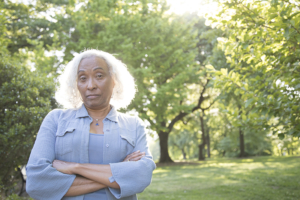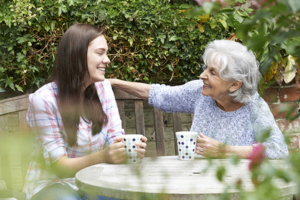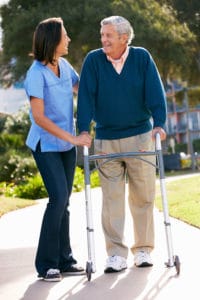Top Tips for Caring for Aging Parents—Even When They Expect A Lot

Partner with Responsive Home Care for superior help with caring for aging parents.
In a perfect world, we could compartmentalize our caregiving duties, staying with a routine that met the needs of a senior loved one, while allowing enough time to manage our myriad of other responsibilities. But needless to say, life does not adhere to our desired script, and conflicting needs are frequent when caring for an aging parent. Many older adults balk at the need for help, while others can come to rely too greatly on an adult child, leading to unfulfilled expectations and ultimately irritation for both parties.
Responsive Home Care’s senior care professionals offer the following tips to help explain expectations and communicate effectively when caring for aging parents:
- Emphasize empathy. As opposed to pulling away from a senior loved one whose demands seem unrealistic, stop and empathize. Think through the problems your parent is facing, and exactly how it might feel to be in his / her shoes. Then voice your honest concern and desire to help.
- Enable each other to be heard. Initiate a discussion with your senior loved one, encouraging her or him to convey how it feels to be in need of care, and what kind of care is necessary. Determine what the older adult’s goals are, and then share your personal expectations and limitations in having the capability to completely meet his or her needs.
- Compromise to come to a solution. Achieving a resolution that works well for both of you might be less difficult than you believe. For instance, in the event that the older adult expects help with transportation in accordance with a particular schedule several times a week, perhaps you can provide that assistance one day, while recruiting the help of others to cover additional days. This allows for increased socialization for the senior as well as the healthy life balance you need.
Responsive Home Care is prepared to partner family caregivers with highly skilled, carefully matched caregivers in Fort Lauderdale and the surrounding areas who are passionate about making life the very best it can be for older adults. Working together with Responsive Home Care enables adult children to make certain their aging parents are well cared for at all times, whether by filling in with respite care where needed, through around-the-clock live-in care, or any number of solutions in between. Just some of the many ways we can help include:
- Running errands
- Planning and preparing nourishing meals
- Keeping the home clean and neat
- Offering friendly companionship to brighten each day
- Creative and highly specialized care for those with dementia
- And much more
Give us a call at 954-486-6440 to discuss the challenges you’re facing, and also to learn how our caregivers in Fort Lauderdale, FL and surrounding areas can help. To learn more about all of the areas we serve in Florida, please visit our Service Area page.

 Agitation is among the more difficult effects of dementia, and may be exceedingly frustrating for family members to manage. The key is in taking steps to handle agitation before it’s felt and expressed by the senior loved one, which involves keeping track of what has triggered these feelings in the past, and establishing a home environment in which those stimulants are eliminated or minimized. The
Agitation is among the more difficult effects of dementia, and may be exceedingly frustrating for family members to manage. The key is in taking steps to handle agitation before it’s felt and expressed by the senior loved one, which involves keeping track of what has triggered these feelings in the past, and establishing a home environment in which those stimulants are eliminated or minimized. The 
 We know that socialization is vitally important for our overall emotional (and even physical) wellbeing – but we also know that senior loneliness is an epidemic in America. With the hectic pace of life, it’s difficult for families and friends to provide the full measure of social interaction needed to keep isolation at bay for older adults, who are often homebound or unable to get out as much as they’d like.
We know that socialization is vitally important for our overall emotional (and even physical) wellbeing – but we also know that senior loneliness is an epidemic in America. With the hectic pace of life, it’s difficult for families and friends to provide the full measure of social interaction needed to keep isolation at bay for older adults, who are often homebound or unable to get out as much as they’d like.

 Lifting chairs themselves are incredibly useful for your senior loved one as they are, but there are add-on accessories that can make the chair even more useful. Determining the right accessories for your loved one can often mean simply assessing her needs.
Lifting chairs themselves are incredibly useful for your senior loved one as they are, but there are add-on accessories that can make the chair even more useful. Determining the right accessories for your loved one can often mean simply assessing her needs. When you find out that your elderly parent is suffering from Parkinson’s disease you are put at the beginning of a journey that will present a wide variety of challenges and demands for your aging parent and for you as their family caregiver.
When you find out that your elderly parent is suffering from Parkinson’s disease you are put at the beginning of a journey that will present a wide variety of challenges and demands for your aging parent and for you as their family caregiver. Spending time outside of the house with an elder who has dementia can be both frustrating and challenging. If they are in the later stages of the disease, you may have to worry about the elder wandering or displaying abnormal behaviors. While it can be terrifying and possibly embarrassing to even consider going out in public with your loved one, it is something you and the elder should do from time to time.
Spending time outside of the house with an elder who has dementia can be both frustrating and challenging. If they are in the later stages of the disease, you may have to worry about the elder wandering or displaying abnormal behaviors. While it can be terrifying and possibly embarrassing to even consider going out in public with your loved one, it is something you and the elder should do from time to time. One minute your aging parent could be reading a book or watching TV, and the next they could be clenching their chest as a major heart attack takes over their body. This is usually how heart attacks work. Without any noticeable symptoms, it is very difficult to detect when one is about to hit.
One minute your aging parent could be reading a book or watching TV, and the next they could be clenching their chest as a major heart attack takes over their body. This is usually how heart attacks work. Without any noticeable symptoms, it is very difficult to detect when one is about to hit. November 24 is Thanksgiving Day, which might make it appropriate that November 25 is Flossing Day. Using a proper flossing technique is essential to maintaining oral health, which can make a tremendous impact on your senior parent’s overall health and well-being throughout their later years.
November 24 is Thanksgiving Day, which might make it appropriate that November 25 is Flossing Day. Using a proper flossing technique is essential to maintaining oral health, which can make a tremendous impact on your senior parent’s overall health and well-being throughout their later years. The objects that you have in your home are a representation of the life that you have lived. This absolutely applies to your aging parent, who likely has objects that they have owned for decades. This does not mean, however, that they should hold on to everything that they have. Downsizing is an important task for elderly adults who are either transitioning into a new home or who have accumulated too many belongings over time and need to start clearing them out.
The objects that you have in your home are a representation of the life that you have lived. This absolutely applies to your aging parent, who likely has objects that they have owned for decades. This does not mean, however, that they should hold on to everything that they have. Downsizing is an important task for elderly adults who are either transitioning into a new home or who have accumulated too many belongings over time and need to start clearing them out.